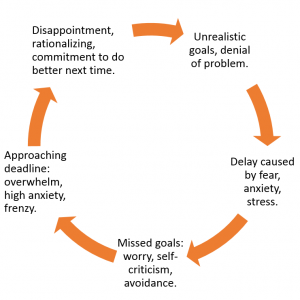We all procrastinate, right? I was going to post this yesterday.
But procrastination is a serious problem for some legal writers, and I’ve just finished a fascinating article that educated me about the subject. David A. Rasch & Mehan Rasch, Overcoming Writer’s Block and Procrastination for Attorneys, Law Students, and Law Professors, 43 N.M.L. Rev. 193 (2013). It’s a thorough treatment and showed me not only that some lawyers face career-threatening procrastination problems but that my my own problems aren’t actually that bad. If yours are, I recommend the full article; here are a few key points.
Procrastination is like many other serious problems—it has a cycle. I’ve captured the key components of that cycle here:
See 43 N.M.L. Rev. at 206.
To break out of this cycle, try these tips from the authors:
-Study your own avoidance techniques. See id. at 225. Figure out what you’re doing, and not doing, to sabotage your own ability to start and finish writing projects. In other words, identify the underlying problems.
-Be deliberate in setting times and places where you will write. See id. at 227. Make a plan. Arrange times and places where distractions are minimal.
-Schedule a regular time to write. See id. at 228. This is nearly universal advice for anyone who writes and wants to be productive. Set aside 30 minutes, 60 minutes, or more at the same time each day—or on as many days as you can—and write.
-Break up big projects into manageable chunks. See id. at 229. Writing a book seemed overwhelming to me, so I started with a chapter. The same idea can work for a memo, motion, brief, report, or any other legal document. Write one part, then another, and so on.
-Reward yourself when you’ve completed one of these other tips. See id. at 230.
-If procrastination is a big enough problem, seek professional help. See id. at 231 n. 94.
